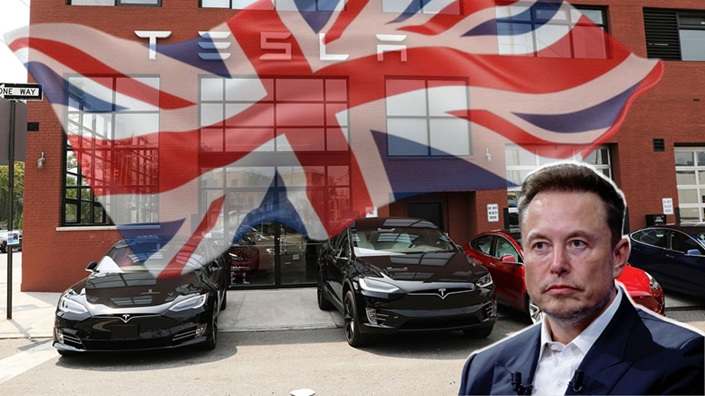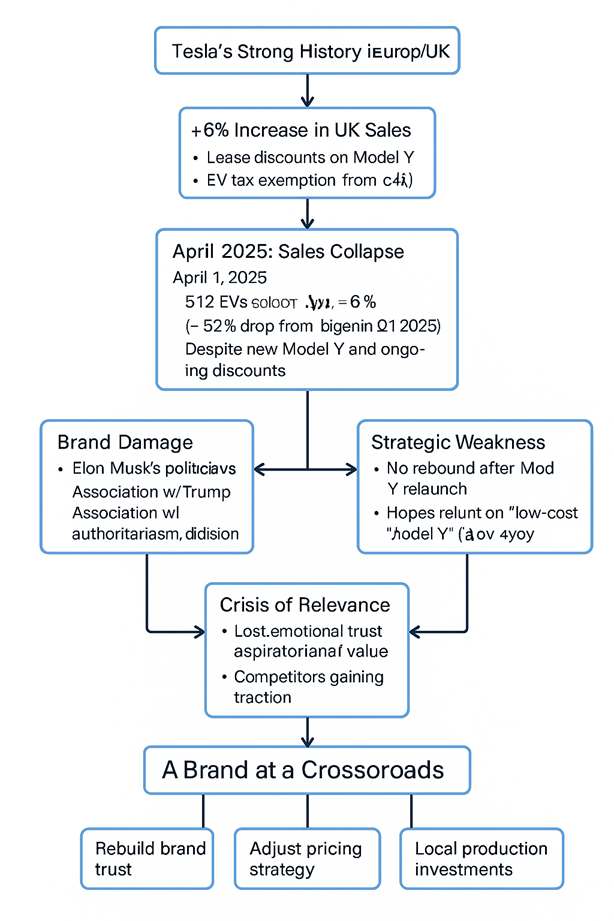Tesla has long been seen as the electric vehicle (EV) king, especially in markets like Europe and the UK. But recent numbers tell a different story—one that suggests the electric revolution Tesla helped spark may be slipping out of its hands.
Throughout the first quarter of 2025, Tesla sales performance across Europe has been rough—no, disastrous. In almost every European country, Tesla’s EV deliveries dropped sharply. The lone exception? The UK. For a brief moment, it looked like Britain might be the brand’s safe haven.

In Q1 2025, Tesla’s UK sales actually rose by 6%, making it the only market in Europe where the company wasn’t in decline. This sudden boost wasn’t just luck. It came from steep lease discounts on the new Model Y and a tax loophole that made EVs more attractive to British buyers. Under the UK’s previous tax rules, EVs worth over £40,000 were exempt from the luxury car tax, giving buyers thousands of pounds in savings. But that incentive expired on April 1, 2025—and so did Tesla’s sales momentum.
From Leader to Laggard
Now the latest registration data is out, and it paints a stark picture: Tesla delivered just 512 electric vehicles in the UK in April. That’s a 62% drop compared to April 2024, and a 65% drop from the beginning of Q1 2025. The crash comes even though the refreshed Model Y is now available—and Tesla is still offering discounts on older inventory. Clearly, the once-loyal UK market is cooling off. And it’s not just about prices or inventory—Tesla is facing a much deeper issue.
A key factor in Tesla’s declining popularity isn’t the cars—it’s the man behind them. Elon Musk, Tesla’s CEO, has increasingly made headlines for his controversial political stances and outspoken support of figures like Donald Trump. In both the US and abroad, Musk’s involvement in divisive politics is starting to affect how people see the Tesla brand.
Some former Tesla fans now associate the company with anti-democratic values and authoritarianism due to Musk’s financial and vocal backing of Trump—who has been criticized for defying court orders and using his office for personal gain. As a result, Tesla’s image as a clean, forward-thinking brand is being replaced by something far more polarizing. And in image-conscious markets like the UK and Europe, that matters more than ever.
With sales now falling across all of Europe—including the once-reliable UK—Tesla’s dominance in the region is under serious threat. Even some of Tesla’s most loyal investors and fans are struggling to explain what’s going wrong. At first, many blamed the Q1 dip on a temporary production pause for the new Model Y. But now that production is supposedly back on track, there’s no recovery in sight.
Some are clinging to the hope that a “low-cost” Model Y will turn things around. But even if that model arrives soon, it’s unlikely to reverse a 50% sales decline across Europe. At best, it might soften the blow—but Tesla would still be down around 30%, and that’s compared to 2024, which was already a weak year.
Tesla’s situation in Europe reflects a bigger issue: its brand, once seen as bold and revolutionary, is now facing a crisis of relevance and trust. While the cars themselves are still strong from a technical perspective, the company’s connection with consumers appears to be fraying.

Why does that matter? Because Tesla isn’t just an EV company—it’s a brand people believed in. Many early adopters chose Tesla not just because of the range or speed, but because it represented a better, greener future. Now, with public sentiment shifting and new competitors offering compelling alternatives, Tesla’s grip on the EV market is weakening.
Tesla still has tools at its disposal. It could revamp its pricing strategy, invest more in local production, or double down on brand repair. But none of that will work unless the company first acknowledges that there’s a real problem. The UK’s 62% year-over-year decline should be a wake-up call—not just for Elon Musk, but for anyone who still sees Tesla as untouchable in the EV space.
The first step in fixing a problem is admitting you have one. For now, it seems Tesla—and many of its die-hard fans—still aren’t ready to do that. Tesla’s dramatic sales crash in the UK is more than just a number—it’s a warning sign. The end of tax breaks, rising public backlash, and leadership controversies are colliding to threaten the brand’s position in one of the world’s most influential EV markets.
If Tesla wants to stay ahead, it needs more than flashy models and discounts—it needs to rebuild trust, rethink its strategy, and reconnect with the customers who once championed its mission.
Related Post
